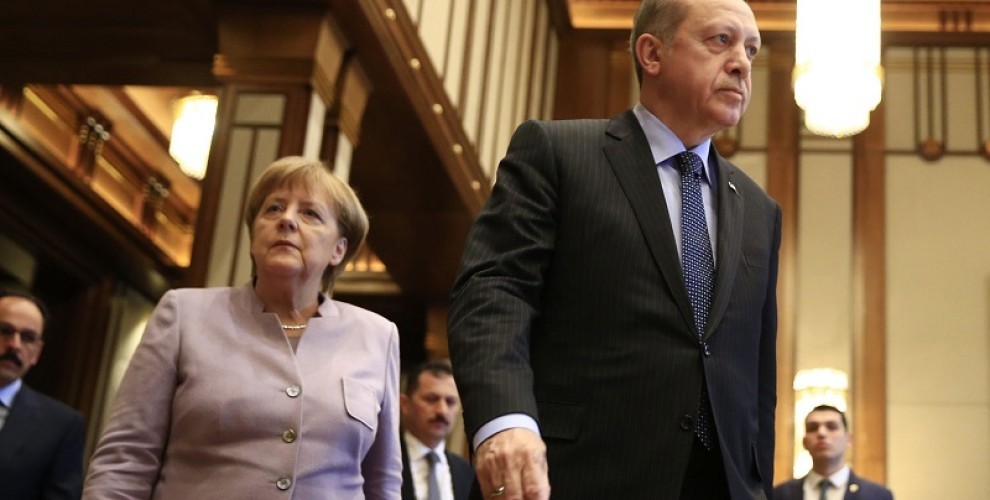Turkish elections: will Germany allow Erdogan to rally?
Erdogan made his last speech as a President in Germany in Karlsruhe in May 2015. In July 2016, Erdogan was not allowed to join the AKP rally in Cologne via a videolink.
Erdogan made his last speech as a President in Germany in Karlsruhe in May 2015. In July 2016, Erdogan was not allowed to join the AKP rally in Cologne via a videolink.

Last year, during the referendum held in Turkey on 16 April 2017, Germany experienced a serious crisis. Referendum rallies that the AKP ministers wanted to organize in Germany, were banned, and Erdogan was indirectly declared an 'unwanted politician'.
A similar crisis to that lived on 16 April between Berlin and Ankara is now at the door once more. Turkish President Recep Tayyip Erdogan and the MHP, his racist party allied, have confirmed that early elections in Turkey will be held on 24 June, and they are now waiting to see which attitude German Chancellor Angela Merkel will take. Germany in fact is seen as an important “vote storage” especially for the AKP government.
Immediately after the announcement of the early elections in Turkey, many politicians in Germany have demanded to ban the rallies that Erdogan wants to do. Speaking to German news agency DPA, Annegret Kramp-Karrenbau the Secretary-General of the CDU (Christian Democratic Union) said that the Turkish election campaign should not be moved to Germany.
Earlier Saarland province's president Cramps-Karrenbau had reminded that “we do not want the discussions about Turkey's domestic politics hampering cities in Germany. The struggle between Turkish political parties cannot happen here".
The other government coalition partner, the Social Democratic Party (SPD), left to parliamentarian Burkhard Lischka a comment on the situation. Lischka said: “Erdogan should be doing his campaign at home, in Turkey not here in Germany”.
Cem Özdemir, former leader of the Green Party, argued that Erdogan could actually strengthen his power in the elections if the AKP would be prevented from organising rallies. Speaking on SWR German tv and radio, Ozdemir argued that it would be the decision of the federal government to allow or not a place to the Turkish electoral struggle.
Speaking to DPA, AKP deputy Mustafa Yeneroglu stated that a crisis similar to that witnessed on the occasion of the 16 April referendum in Germany will not happen this time. Yeneroglu, who is in charge of the AKP's work in Germany, said: "We will make every effort to prevent a crisis in Turkish-German relations during this election period."
While it is not known whether Erdogan and AKP ministers are planning any show in Germany, it has emerged that German president Frank-Walter Steinmeier has actually invited Erdogan to Germany.
A spokesman for the German presidency confirmed to the paper Spiegel that the invitation was made during a telephone conversation between the two presidents a few weeks ago.
Following the 16 April crisis and in order to prevent such events from happening again, the last Merkel government had actually presented a law banning foreign leaders from rallying in Germany. The law was adopted in the Bundestag last June and relates to non-EU countries.
According to the law, representatives and politicians from countries outside the EU will no longer be able to carry out election campaigns in Germany. The legislation that will come into force three months before the elections to be held in these countries forbids any election activity. In addition, all the activities planned by foreign politicians in Germany are now subject to the federal government's permission.
Erdogan made his last speech as a President in Germany in Karlsruhe in May 2015. In July 2016, Erdogan was not allowed to join the AKP rally in Cologne via a videolink. Before the April 16 referendum, Germany did not allow the AKP to rally which prompted Erdogan to unleash a series of heavy insult against Germany administration that he likened to the Nazi regime.
According to the information released before the 16 April referendum, there are some 3 million Turkish voters living abroad. Around 1 million 430 are actually living in Germany.
In the referendum, the percentage of electoral participation in Germany was 47 percent, with 63 percent saying "yes" and 37 percent saying "no".
In the elections held on 1 November 1, the AKP was the first party among the voters in Germany with 59 percent, while the HDP was the second with 16 percent and the CHP third with 14 percent.